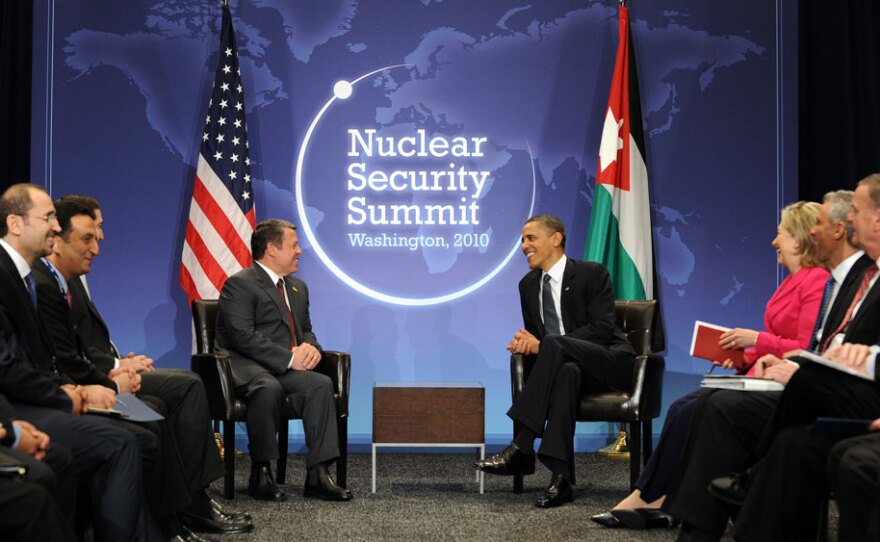President Obama and top officials from 47 countries began negotiations Monday at an unprecedented global summit in Washington to forge a comprehensive plan to halt the spread of nuclear weapons and keep them out of the hands of terrorists.
The meeting is one of the largest gatherings of world leaders hosted by a U.S. president since the 1945 San Francisco conference that founded the United Nations.
The conference was boosted by an announcement from the White House that Ukraine was getting rid of its highly enriched uranium, enough to build several nuclear weapons, by 2012. The announcement was made following a meeting between President Obama and Ukrainian President Viktor Yanukovich.
Earlier, Obama said he and other leaders shared a "sense of urgency."
Obama was scheduled to welcome delegates late Monday afternoon after holding face-to-face meetings with Jordan's King Abdullah II, whose nation's intelligence network is deeply involved in the Afghanistan conflict, as well as the leaders of Malaysia, Armenia and China.
During the meeting with Abdullah, the two leaders discussed Israeli-Palestinian tensions, the situation in Afghanistan, Iraq's recent elections and "Iran's nuclear file," according to a White House statement. "President Obama stressed the importance of international efforts to pressure Iran to ensure that it upholds its international obligations, including through the imposition of sanctions."
Biggest Threat To U.S. Security
Obama has said the single biggest threat to U.S. security is the possibility of a terrorist organization obtaining a nuclear weapon. His goal is to ensure that all nuclear materials worldwide are secured from theft or diversion within four years.
"We know that organizations like al-Qaida are in the process of trying to secure a nuclear weapon, a weapon of mass destruction that they have no compunction at using," he said over the weekend.
If such terrorist groups were able to get their hands on nuclear weapons, it "could change the security landscape in this country and around the world for years to come," Obama said.
The White House also will be seeking to shore up support for stricter sanctions on Iran over its nuclear program. China and Russia are leaning toward backing such sanctions, but U.S. diplomats hope to solidify cooperation during the summit.
The summit is a key element in the U.S. administration's hopes — laid out by Obama during a 2009 speech in Prague — for significant nuclear reductions and a nuclear-weapons-free world. Last week, Washington and Moscow signed their first arms reduction treaty in nearly two decades. If that pact is ratified by the U.S. Senate and Russia's Duma, it will cut both countries' nuclear arsenals by almost one-third.
During the conference, Russian President Dmitry Medvedev is expected to sign a long-delayed joint agreement with the U.S. under which both nations would dispose of 34 metric tons of arms-grade plutonium from Cold War-era nuclear weapons — the type of preventive action Obama wants the summit to inspire.
Medvedev, appearing on ABC's Good Morning America, said he agrees that Iran's nuclear program must be watched closely, but he warned against sanctions that might "lead to humanitarian catastrophe, where the whole Iranian community would start to hate the whole world."
"I don't think on that topic we have a chance to achieve a consolidated opinion of the global community," he said Monday.
Locking Down The Arsenal
Secretary of State Hillary Clinton said Friday that with the end of the Cold War, "the nature of the threat has changed."
"We no longer live in constant fear of a global nuclear war, where we're in a standoff against the Russians with all of our nuclear arsenal on the ready," she said. "But as President Obama has said, the risk of a nuclear attack has actually increased. And the potential consequences of mishandling this challenge are deadly."
The stockpiles of plutonium and highly enriched uranium around the world are large enough to produce more than 120,000 nuclear weapons. A significant portion of that material is still vulnerable, says Gary Samore, director for nonproliferation in the National Security Council.
"If we're able to lock those down and deny them to nonstate actors, then we have essentially solved the risk of nuclear terrorism," he says.
The Washington summit is intended to rally world leaders to take action urgently.
U.S. National Security Council spokesman Ben Rhodes said Obama also planned to meet with Turkish Prime Minister Recep Tayyip Erdogan to discuss "pressing issues," including the normalization of relations between Turkey and Armenia.
On Sunday, Obama met with Indian Prime Minister Manmohan Singh, Pakistani Prime Minister Yousuf Raza Gilani, South African President Jacob Zuma and Kazakh President Nursultan Nazarbayev. He said afterward that he was pleased by the tenor of the conversations.
"I feel very good at this stage in the degree of commitment and a sense of urgency that I have seen from the world leaders so far on this issue," Obama told reporters.
Neither India nor Pakistan, which first tested atomic weapons in 1974 and 1998 respectively, has signed the Nuclear Non-Proliferation Treaty. North Korea, which tested a device in 2006, is also not a party to the NPT and is not attending the summit.
NPR's Mike Shuster contributed to this report
Copyright 2022 NPR. To see more, visit https://www.npr.org. 9(MDAzMjM2NDYzMDEyMzc1Njk5NjAxNzY3OQ001))






